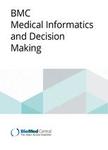版权所有:内蒙古大学图书馆 技术提供:维普资讯• 智图
内蒙古自治区呼和浩特市赛罕区大学西街235号 邮编: 010021

作者机构:Georgia Inst Technol Coulter Dept Biomed Engn Atlanta GA 30332 USA Georgia Inst Technol Dept Elect & Comp Engn Atlanta GA USA
出 版 物:《BMC MEDICAL INFORMATICS AND DECISION MAKING》 (BMC医学信息与决策)
年 卷 期:2024年第24卷第1期
页 面:137页
核心收录:
学科分类:1001[医学-基础医学(可授医学、理学学位)] 10[医学]
基 金:Wallace H. Coulter Distinguished Faculty Fellowship Petit Institute Faculty Fellowship Amazon
主 题:Causal inference Precision medicine Meta-learning Causal graph learning
摘 要:Background Modeling causality through graphs, referred to as causal graph learning, offers an appropriate description of the dynamics of causality. The majority of current machine learning models in clinical decision support systems only predict associations between variables, whereas causal graph learning models causality dynamics through graphs. However, building personalized causal graphs for each individual is challenging due to the limited amount of data available for each *** In this study, we present a new algorithmic framework using meta-learning for learning personalized causal graphs in biomedicine. Our framework extracts common patterns from multiple patient graphs and applies this information to develop individualized graphs. In multi-task causal graph learning, the proposed optimized initial guess of shared commonality enables the rapid adoption of knowledge to new tasks for efficient causal graph *** Experiments on one real-world biomedical causal graph learning benchmark data and four synthetic benchmarks show that our algorithm outperformed the baseline methods. Our algorithm can better understand the underlying patterns in the data, leading to more accurate predictions of the causal graph. Specifically, we reduce the structural hamming distance by 50-75%, indicating an improvement in graph prediction accuracy. Additionally, the false discovery rate is decreased by 20-30%, demonstrating that our algorithm made fewer incorrect predictions compared to the baseline *** To the best of our knowledge, this is the first study to demonstrate the effectiveness of meta-learning in personalized causal graph learning and cause inference modeling for biomedicine. In addition, the proposed algorithm can also be generalized to transnational research areas where integrated analysis is necessary for various distributions of datasets, including different clinical institutions.